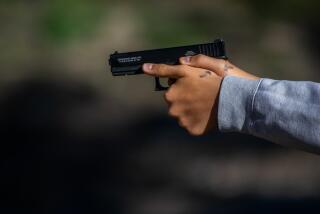Some ‘A’ Students Lead Dual Lives as Gangbangers : Youth: The Asian Americans say they are torn between values of parents, friends. Some engage in serious crime.
HUNTINGTON BEACH — Gripping a pipe he picked up off the street, Phuoc Nguyen and more than a dozen of his friends swaggered along the dusty railroad tracks, preparing to do battle with a group of Latino youths who they said had been hassling them at school.
Police arrived before a fight broke out and immediately targeted Phuoc because he was armed for attack. Only weeks earlier, the 13-year-old, who describes himself as a former gang member, had been detained by police and suspended from school for allegedly beating two students at another campus, school officials said.
As punishment, Phuoc was ordered by the Westminster School District to complete a two-week program for troubled youths--not exactly the kind of place you would expect to find a straight-A student whom school officials have described as an academic star.
“I have two lives,” said Phuoc, a recent graduate of Stacey Intermediate School in Huntington Beach, whose mother agreed to let him be identified for this story. “I want to do good in school, but I like to hang out and go places with [my gang friends.] What I don’t like is doing bad things, but sometimes it’s hard to stay away because they say, ‘Come on, come on.’ ”
The vast majority of Asian American honor students are not gang members, and the vast majority of Asian gang members do not excel in school. But police, school officials and gang experts say they have begun to notice a contingent of students--almost all of them Asian Americans--who maintain gang ties and top grade-point averages.
“We’ll hear that an Asian gang member is arrested for home invasion, and then realize that the kid is a straight-A student,” said Sheri Jones, principal at Stacey Intermediate School. “Their attitude is, ‘When I come to school, I get good grades, so what’s your beef? What I do after school is my own time.’ ”
The youths are walking anomalies, living dangerously and impulsively when they are among friends, but often taking on dramatically different personalities at school by earning top grades and academic awards.
No one can estimate the number of Asian gang members who are top students, but school, police and other officials in Orange and Los Angeles counties say the phenomenon is not rare.
“We see a lot of very intelligent kids from well-to-do families getting involved in gangs,” said Bill Howell, a Los Angeles County sheriff’s deputy who specializes in Asian organized crime. “I’m not going to say the majority are Rhodes scholars, but I will say that it’s not uncommon to see a kid in a gang with a straight-A grade-point average and a scholarship to college.”
In recent years, Asian American gang members and gang wanna-bes who also excel in school have made news in Orange County. Before he murdered fellow honor student Stuart A. Tay, Robert Chan, a candidate for class valedictorian who was headed for an Ivy League education, bragged to his friends that he was a member of the notorious Chinese gang Wah Ching.
Chan was sentenced to life in prison without parole for orchestrating a slaying that shocked the county. It’s uncertain whether Chan actually was a member of the gang, but authorities say he was a suspect in the 1992 beating of a teen-ager who apparently criticized Wah Ching.
Once a highly regarded UC Irvine biology student who aspired to go to medical school, Dan Trung Hoang, 20, now waits behind bars at the Orange County Jail facing a minimum of 15 years in prison after his April 6 conviction for attempted murder, assault with a deadly weapon and committing crimes for the benefit of a street gang.
A jury concluded that the former honor student from Anaheim’s Katella High School acted in association with the Alpha Kappa Piru street gang, although Hoang denies the affiliation.
Many high-achieving students are drawn into gangs because they seek the thrills, acceptance, power and material possessions that good grades don’t always bring. Authorities say that despite their gang affiliations, some Asian Americans still strive for top grades because they are under pressure from their parents to succeed.
“Asian immigrant families tend to push their kids very hard to excel in school,” said Bruce Davis, Garden Grove Police Department gang investigator. “As long as their kids are doing well in school, they think everything is OK.”
Problems arise, experts say, because many Asian students adopted American beliefs after coming to the United States, while their parents adhere to traditional Asian customs. They say some high-achieving students have estranged or distant relationships with parents and feel unwelcome or misunderstood at school.
“They may be bright, but their emotional support is weak,” said Sam Ho, a gang counselor at the Vietnamese Community of Orange County. “They’re not accepted by their family because they’re too Americanized, and they don’t feel accepted at school because they’re Vietnamese.”
Ho said many Asian parents also do not understand American schools, and are little help when their children run into racial tension or unfair treatment.
Hoang went from a diligent premed student to a convicted felon after a Nov. 15, 1994, incident in an Irvine supermarket parking lot. After Hoang and four of his friends argued with people in three other cars, one of the antagonists punched Hoang’s friend, a juvenile, in the face, court records show.
Hoang grabbed a gun that his friend had stashed in the car, got out and pointed the weapon at the driver of one of the other cars, records show. But Hoang dropped the gun when he was tackled by several others.
Hoang’s friend grabbed the gun and shot two men. As Hoang drove off, his friend fired more shots from the car, hitting one of them again, records show.
Hoang was convicted of three counts of attempted murder with gang enhancement because the jury believed he conspired to kill the men to uphold the honor of the gang to which his friend belonged, officials said. In his testimony, Hoang argued that he acted in self-defense and was not a gang member or associate.
“I’ve received dozens of letters from his teachers, friends and other people who are just shocked that he’s connected to something like this,” said Frederick McBride, Hoang’s attorney. “In their letters, these people paint Dan as an honest, intelligent, hard-working and good-natured person.”
Some community activists believe many Asian American youths are mistakenly labeled as gang members because they hang out with gang members or dress a certain way. They contend that’s why so many Asian American teen-agers--some of whom are top students--are pegged as gang members.
Authorities admit that students sometimes are misidentified, but they say Asian gangs are becoming so pervasive that they attract even those who would seem to have other options.
Phuoc, for example, has been an academic standout since he was young, bringing home top grades and skipping the seventh grade at his teacher’s urging. His sister remembers how he used to do his eldest brother’s high school homework when he was barely out of elementary school.
“Phuoc didn’t want his brother to get in trouble at school,” said Loan Nguyen, his 18-year-old sister. “No one asked him to do it. He just did it. That’s how smart he is.”
But Phuoc acknowledges that he is also drawn to gangs. And even though he says he has “walked out” of his gang, Notoma Boys Junior, he still hangs out with its members and keeps himself plugged into gang activities.
Almost everywhere Phuoc goes, he is reminded of the power of gangs--at school, at the mall, at parks and even at home. Phuoc said he earns good grades to please his parents, but he sees little other incentive to study. Mai Nguyen, Phuoc’s mother, struggles to hold back tears as she talks about her children, who are turning to gangs one by one.
“I cry all the time because I know my kids are involved in gangs,” she said through an interpreter. “I stay up every night waiting for them to come home. I’m hoping . . . Phuoc will be better. But it’s really difficult to control him because he listens more to his friends than his family.”
In another case, an Arcadia 17-year-old with alleged ties to the Wah Ching gang spent 22 days in various juvenile facilities in the brutal assault of an Asian teen-ager. The charges were dropped for lack of evidence, but the youth was already on probation for an earlier group assault and battery.
At the same time that the tall, lanky teen-ager was building a criminal record, he was earning top grades at Arcadia High School. In addition to maintaining a 3.5 grade-point average, he scored 1,320 out of a possible 1,600 on the Scholastic Aptitude Test, ranking him in the top 4% of students who took the test, according to the New Jersey-based Educational Testing Service, which administers the exam.
He also is college-bound, with aspirations of becoming an engineer like his father. He was accepted to UCLA and UC Irvine, but decided to attend UC Santa Barbara because of its strong engineering program.
“He’s a smart kid, but he’s still tied in with the gangs,” said Chris Kuk, a Los Angeles County probation officer who works exclusively with Asian gang members.
As he slouches in a chair at Los Angeles County probation headquarters in a black jacket and hoop earrings, the youth said he had little difficulty combining gang membership with his studies.
“I have two groups of friends--schoolboy friends and gang friends,” he said. “I studied because I wanted to please my mom with good grades. But I also wanted the respect and name of a gang.”
He said the reason he joined Wah Ching shortly after he transferred to Arcadia High was simple: “I was jumped by six guys when I first got to Arcadia High. A guy came up to me and asked me if I wanted him to back me up if I got jumped again. I said OK. One thing led to another.”
At Arcadia High and other schools in the San Gabriel Valley, he said, gang members get girls and respect and drive the best cars.
“It was like a hobby,” he said. “I look at it as an extracurricular activity.”
But the “hobby” had its price: The young man said he was distraught watching his mother weep when she visited him at various juvenile facilities. “She kept blaming herself. She would say ‘just take care of yourself, we’re doing everything to help you.’ ”
Neil Snowden, an assistant principal at Westminster High School, said some Asian gang members are able to keep up their “honor student persona” through high school and end up at top colleges. Others, however, lose interest in school when they become too heavily involved in gangs.
One 22-year-old former gang member who attended Ocean View High School in Huntington Beach lost a chance to win a college wrestling scholarship when he was sentenced to three years in prison for attempted murder.
“I joined a gang because things were tense with my own family,” said the young man, who was released from prison last year and did not want to be identified because he still fears members of his former gang. “I couldn’t turn to my own family for help, and the gang seemed like they would be there for me.”
As a teen-ager, he said, he and fellow gang members committed robberies, home invasions, burglaries and even murders of rivals.
“We did it for money and power,” he said. “I blocked out all my mental feelings, and after a while, I could commit crimes without any feelings.
“I lost my soul. There’s two people inside of me. One is a ruthless killer and the other is a lost, sensitive person.”
More to Read
Sign up for Essential California
The most important California stories and recommendations in your inbox every morning.
You may occasionally receive promotional content from the Los Angeles Times.










